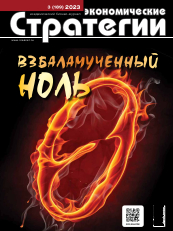Formation of a Mechanism for Regulating Pricing in the Modern Economy
DOI: 10.33917/es-1.187.2023.136-143
The author puts forward suggestions and recommendations on the formation of adaptive mechanisms for regulating pricing processes as an element of a single integrated system of economy state management and ensuring the balanced development of the RF regions. It is proposed to create a system for monitoring pricing processes, to form a price (tariff) fund based on the above system functioning, to modernize the structure of the pricing management elements and, as a legal basis for their implementation, to develop a draf t federal law on prices and pricing processes, which will consolidate the indicated directions for forming a regulation mechanism of pricing processes in the legal field.
References:
1. Filosofiya ekonomiki. Antologiya [Philosophy of Economics. Anthology]. Pod red. Deniela Khausmana. Moscow, Izd-vo Instituta Gaidara, 2012, 502 p.
2. Yaremenko Yu.V. Ekonomicheskie besedy. Zapis’ S.A. Belanovskogo [Economic Conversations. Recorded by S.A. Belanovsky]. Moscow, Tsentr issledovanii i statistiki nauki, 1998, 343 p.
3. Rossiya v tsifrakh. 2020: Kratkii stat. sb. [Russia in Figures. 2020: Brief Statistical Collection]. Rosstat. Moscow, 2020, 550 p.
4. Perevyshin Yu.N., Sinel’nikov-Murylev S.G., Skrobotov A.A., Trunin P.V. Analiz regional’noi differentsiatsii tsen [Analysis of Regional Price Differentiation]. Moscow, Delo, RANKhiGS, 2018, 72 p.
5. Stupnikova A.V. Prostranstvennye reaktsii tsen na rynkakh ovoshchei na ogranicheniya vneshnei torgovli [Spatial Price Responses in Vegetable Markets to Foreign Trade Restrictions]. Prostranstvennaya ekonomika, 2018, no 1, pp. 117–137.
6. Stupnikova A.V. Dinamika urovnya prostranstvennoi differentsiatsii tsen na prodovol’stvennye tovary v RF v 2013–2018 gg. [Dynamics of the Spatial Differentiation Level of Food Prices in the Russian Federation in 2013-2018]. Regional’naya ekonomika i upravlenie: elektronnyi nauchnyi zhurnal, 2019, no 2(58), pp. 1–15.
7. Yarkin E.V., Dolmatov I.A., Panova M.A., et al. Tarifnaya politika v Rossiiskoi Federatsii v otraslyakh kommunal’noi sfery: prioritety, problemy, perspektiva: Doklad k XXI Aprel’skoi mezhdunarodnoi nauchnoi konferentsii po problemam razvitiya ekonomiki i obshchestva. Moskva, 2020 g. [Tariff Policy of the Russian Federation in the Public Utilities Sectors: Priorities, Problems, Perspective: Report to the XXI April International Scientific Conference on the Problems of Economic and Social Development. Moscow, 2020]. Moscow, ID Vysshei shkoly ekonomiki, 2020, 174 p.
8. Ukaz Prezidenta RF ot 13 maya 2017 g. no 208 “O Strategii ekonomicheskoi bezopasnosti Rossiiskoi Federatsii na period do 2030 goda” [Decree of the President of the Russian Federation of May 13, 2017 No. 208 “On the Strategy for the Economic Security of the Russian Federation for the period up to 2030”]. SZ RF, 15.05.2017, no 20, st. 2902.
9. Kovalev A.V., Orlova L.N. Tsena kak nedootsenennyi parametr sistemy obespecheniya ekonomicheskoi bezopasnosti strany [Price as an Underestimated Parameter of the Country’s Economic Security System]. Vestnik Rossiiskogo ekonomicheskogo universiteta imeni G.V. Plekhanova, 2021, no 18(2), pp. 178–198.













